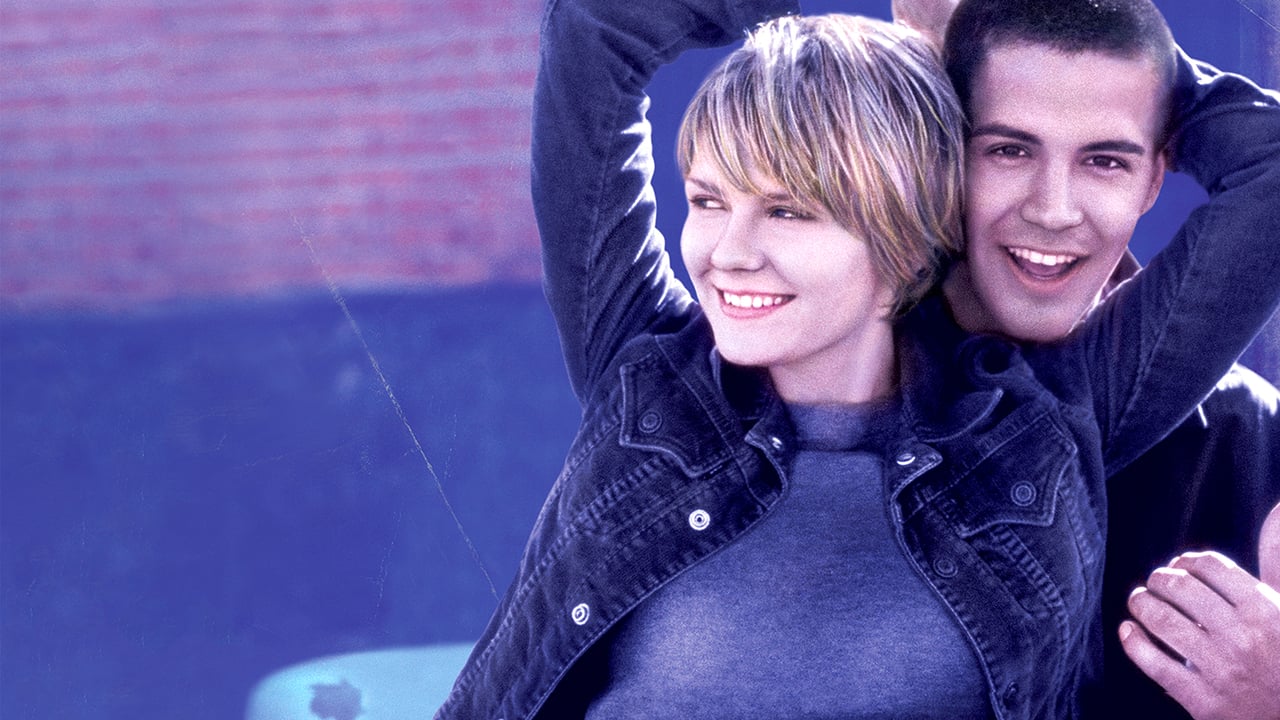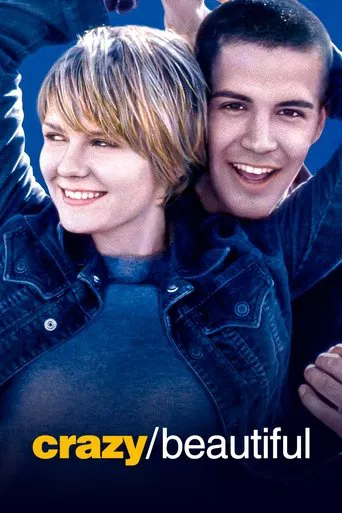

The greatest movie ever!
... View MoreIt's no definitive masterpiece but it's damn close.
... View MoreIf you like to be scared, if you like to laugh, and if you like to learn a thing or two at the movies, this absolutely cannot be missed.
... View MoreStory: It's very simple but honestly that is fine.
... View MoreCrazy/Beautiful, originally inspired by Lauren Greenfeld photos 'Fast Forward'. A 'crazy' Malibu daughter of a wealthy congressman and a 'beautiful' first generation Mexican son of a hard-working Mexican-American family: 'Crazy/Beautiful are these two 17-years-students at a high school in Pacific Palisades. Nicole: wild, a drinker, sexually bold, reckless. Without much makeup on her face she gives the impression of being naked and 'ugly'. Without a future as everything has been thrown over board: every possible rule she did not care. Everything lost and the only option the 'nicoledecision' "so what!". But: "I wish I wasn't the child that everybody learned what not to do from." The grade A student Carlos with big dreams for a better barriofuture endures a two-hour bus ride every morning to school. The beautiful Carlos and the crazy Nicole are ready for the mistakes of their first love. Nicole and everybody know: in her sphere are all doomed. Her father warns Carlos: "For your own good, for my piece of mind. Stay away from my daughter. You know, it's a painful thing for a father. I can't help you alone". The fatherless Carlos vs the motherless Nicole. Nicole is the first of them to realize: "I think I'm in love with you, sorry." And later: "There are millions of people in this world, but in the end it all comes down to one. I still panic sometimes, forget to breathe, but I know that there's something beautiful in my imperfections; the beauty that he held up for me to see. The strength that I will never be able to say." And assuring him: "I want to be good for you." But Carlos, son of a poor barrio family, family helped to be something better, has a lot to loose. This the reason why he listens as the fatherless son he is to the congressman's warning. And Nicole knows: "What did he tell you, Stay away from me, the lost cause?" "I just..." answers Carlos. But! Both are beyond the point-of-no-return, following Hollywoods twists and turns. After their split: The worried Carlos fetches her from that wild party. Both are caught in a police control and Nicole delivered at her home. (Stepmom Courtney: "What kind of daughter are you?" Nicole: "Not yours." Courtney: "Thank god for that.") At school the day after she collects her belongings. Carlos sees her with a man. Not her father but an official to escort her to Utah. And Carlos reacts, despite midterm exams, realizing 'his' 17-years-first-love. Their run-away, their talk at the motel and her return home. The schmaltzy ending. The soft kindness of the good-enough-father is unable to set the rule when needed. Nothing else but a fathers obligation. A none-father and a none-husband when needed, the reason that he lost his daughter, the reason for his wives suicide? Instead an institution as step-in-father with official escort: "Why do you hate me so much? How could you tell the only person in the world that I love, that I care about so much, how could you tell him to stay away from me? Do you think that the only thing I'll ever do to someone is screw them up? That I'm not worth loving?" At Carlos sisters birthday party Nicole sees that she is far more poor than the birthday celebrating poor barrio family: "You can be anywhere where when your life begins. You meet the right person and anything is possible." Here, beyond everything: ready for the real. What Crazy/beautiful teaches (eavesdropping) is that the nicolestyle is the only option but not easy. To come to this kind of point-of-no-return and be there as unwanted outcast waiting - waiting for one of the millions. The movie wanted more, but had in mind the PG-13 rating, limited to those over 17. The movie lets us see people and not look at case studies.
... View MoreFrom director John Stockwell (Blue Crush), I didn't think this film was completely predictable, but it certainly had quite a clichés, but it is still viewable. Basically troubled and wealthy 17-year-old Nicole Oakley (Kirsten Dunst) always breaks rules, and she meets grade-A student Carlos Nuñez (Jay Hernandez) who has big dreams. They are first innocently flirting, but they quickly develop a passionate love, only to be spoilt by Nicole's self-destructive behaviour and Carlos's future in jeopardy. Even with the objection by their families, they do eventually get back together for a relatively happy ending. Also starring Bruce Davison as Tom Oakley, Herman Osorio as Luis, Miguel Castro as Eddie, Tommy De La Cruz as Victor, Soledad St. Hilaire as Mrs. Nunez, Lucinda Jenney as Courtney Oakley and Taryn Manning as Maddy. Dunst really proves herself as a good young actress, it has a good soundtrack, and the story has some interesting moments, this is certainly one to try, a good teenage romantic drama. Worth watching!
... View MoreKirsten Dunst's portrayal of an out-of-control early-stage alcoholic/other-drug addict is decent in terms of behaviors. In classic fashion, she blames everyone else for all her problems, is completely irresponsible and turns on a dime against those who are out of favor (her doting dad, for example).The portrayal of enabling isn't bad either. Good boy falls in love with exciting addict. However, in the real world he would have enabled her to her grave. In the absence of the boyfriend, her completely unaware father would have insured she died from her disease. The key problem with the ending--which ruins the movie for the addiction-aware--is that she doesn't die OR get sober. In terms of pure fantasy, the movie ranks with "The Thin Man" series, in which caring, considerate and competent alcoholic PI Nick Charles is never nasty--yeah, right--and "Lost Weekend," in which writer Don Birnam easily gets sober at the end. Sorry, that just doesn't happen.While the movie clearly shows that an excellent upbringing is no impediment to alcoholism, it implies that poor behaviors cause alcoholic drinking. As I have written in four books on the subject and repeatedly point out in my free on-line addiction report, this is one of the great myths of addiction that serves only to perpetuate the disease. The movie's ending can easily cause the uninitiated to believe that "love" and "working" with the addict gets her sober. Every recovering addict alive with at least five years' sobriety will admit that what got them sober was uncompromising tough love and that getting sober was essential for a return to civilized behaviors.If the movie had shown Kirsten's character going into rehab and coming out clean, I might have rated the movie a five. But that would have required either dad or nice boyfriend setting proper boundaries and offering uncompromising tough love--in which case I might have rated the movie a seven. Sorry, but all those comments about "realistic portrayal," "slight substance abuse problem," "what teen doesn't drink?" and "the talk between dad and daughter at the end of the movie is utterly believable" are written by viewers who don't have a clue about addiction. And because of a fatally flawed ending, "Crazy/Beautiful" fails to shed light on the most destructive disease known to man.
... View MoreThis was an excellent performance by the two lead actors, Kirsten Dunst and Jay Hernandez. Their actions and situations were gritty and real, and they seemed very much like real un-Hollywood type characters throughout. And wow ... this was truly a great illustration of the strength of genuine love despite imperfections, despite society's view of what's right and what's wrong and what's successful and what's not. And most of all, I was greatly struck by the illustration of how belief in a person (and love for a person) whom others find unacceptable or unlovable can so powerfully TRANSFORM that person. The Kirsten Dunst character goes through a rather big change, a change that you would've thought impossible, but she pulls it off believably.
... View More